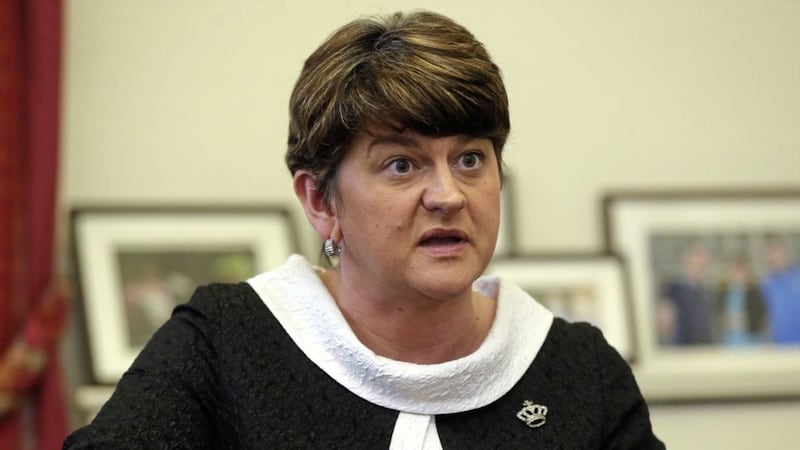What Arlene Foster did in her Sky interview on Wednesday was prepare the ground for an early election.
She set out the issues: 1) The attacks on her are personal, point scoring and misogynistic; 2) Sinn Féin is scared of a strong unionist leader and want rid of her; 3) She has suffered from IRA attacks and she won’t be rolled over by Sinn Féin; 4) Mike Nesbitt is being opportunistic and will weaken unionism and allow Sinn Féin to sneak into the First Minister’s role; 5) She has a plan for bringing the “cost of RHI down to zero,” but isn’t being given the chance to bring it forward; 6) People gave her a mandate to lead last year and she is not afraid of asking them again.
At the core to her response to everything that followed the BBC’s Spotlight programme on December 6, is that she isn’t afraid of an early election. The DUP has done the electoral calculations (and it’s usually very good at those), factored in the reduction of MLAs from 108 to 90 and concluded that they will remain comfortably ahead of the pack: and certainly won’t be eclipsed by either the UUP or Sinn Féin. That’s not to say that the saga hasn’t hugely embarrassed her—not least because she has always taken great pride in her reputation for competence and mastery of detail. And nor will she be comfortable with the constant references to previous problems like Nama and Red Sky.
Yet it needs to be remembered that the DUP has weathered those storms. Indeed, Foster delivered one of the best election results in the DUP’s 45-year history just eight months ago. Of course, if there is an election (and I remain of the view that there won’t be) the DUP can’t just take it for granted that they will win: they will be aware that we live in unpredictable electoral times.
One nightmare scenario is that the unionist electorate would do to the DUP what they did to the UUP in 2007 and opt for Nesbitt rather than Foster. It’s not impossible, but it requires the UUP to hold the 16 seats they have, as well as adding on about 12 more (for the sake of the argument I’m assuming a 47 unionist to 43 non-unionist split in a 90 seat assembly, with a least 2 of the unionists not belonging to either the UUP or DUP), taking them to around 28 seats. But the UUP is coming from a very weak position and may find it hard to get traction on the back of an issue which has been run by the media rather than the opposition parties.
The other nightmare is that the unionist vote is shredded, the SDLP vote collapses and Sinn Féin hold their base and actually add on a couple of seats—allowing them to nudge just ahead of the unionist parties into the first minister’s office. Again, that requires all of the ducks not only to line up in a row, but to break into synchronized swimming as well. So the DUP is working on the basis that the odds are well in their favour and that any losses will be cushioned in the overall reduction of MLA numbers.
There is a buzz on social media that this could be the first election which would be about an ‘issue’ rather than the constitutional question; and that people who hadn’t voted for years would come out to punish the DUP. I don’t see that happening. Why would people who couldn’t bring themselves to vote for any party over the last 25 years suddenly decide that it was worth voting? There aren’t any new parties on the scene and the evidence suggests that non-voters take the “a plague on all your houses” approach to local politics. So no, I’m not predicting a revolution at the polls.
I’m also not convinced that any of the parties actually want an election at this point: unless Alliance, UUP and SDLP hope that while there probably won’t be a breakthrough for them, there might be a chance for all of them to return to the executive. Let’s face it, opposition hasn’t provided much traction for them. The electorate doesn’t like early elections, particularly if they think that nothing much will change as a consequence of the election. And all of the present anecdotal evidence suggests—along with voting patterns since 1921—that voters will continue to do what they have always done: even if a section of DUP voters may be annoyed with the RHI stuff.
Foster’s message is clear: “You want an election? Bring it on.” She also knows that an early election is a huge risk for Sinn Féin, particularly if she returns with a comfortable mandate and a Cheshire Cat grin of satisfied vindication all over her face.
As I said last week: Plus ça change, mes amis; plus ça change.








